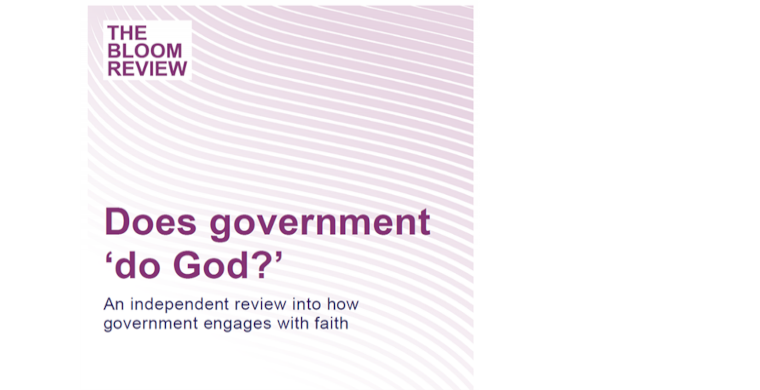BLOOM REVIEW INTO FAITH IN MODERN BRITAIN
Report finds 'Some members of both Christian and minority religions felt they were at risk of being marginalised, de-platformed, or even losing their jobs for practising their faiths or beliefs.'
Government responds
https://premierchristian.news/
April 30, 2023
The government needs to improve its understanding of faith and be bolder in recognising faith groups as a force for good. That's according to a review into faith in modern Britain commissioned by the government.
The author of 'Does government 'do God?', Colin Bloom, is an Independent Faith Engagement Adviser. He collected more than 21000 pieces of evidence over three years, including the view among 68% of Christian respondents that 'freedom of religion or belief is under threat in the UK'.
The report finds 'Some members of both Christian and minority religions felt they were at risk of being marginalised, de-platformed, or even losing their jobs for practising their faiths or beliefs.'
It adds 'Many Christian respondents said they no longer feel able to be who they are in public or at work, after experiencing the dismissal of traditional religious beliefs and practices.'
And concludes '.... there was a consistent emphasis among Christian respondents of the danger of no-platforming, and the lack of a decisive response from politicians and government to address this issue.'
The Bloom report makes 22 recommendations to government on how it can celebrate the contribution of faith groups, while tackling harmful practices.
He writes that the government and civic leaders must improve their understanding of faith in order to tackle issues such as forced marriage and religious extremism.
Speaking to Premier Colin Bloom said:
"The rumours that faith is dead are much exaggerated, there are still more people in the UK who have a faith than not. And whilst faith is very different, the religious landscape of the UK is much more diverse than it was a generation or two ago. It is more vibrant, it's more exciting, and makes it makes a huge contribution to society. Without faith, places of worship and people of faith, this country would be poorer, blander and less dynamic. Faith is a force for good, and government should do more to both understand and release the potential of this fantastic resource."
He noted that a better understanding of faith would also equip government to tackle issues such as forced marriage, of which there are estimated to be thousands a year in the UK; radicalisation in prison; and faith-based extremism, including the ongoing challenge of Islamist extremism, and the small but growing trends of Sikh extremism and Hindu nationalism :
"I think everyone could improve their faith literacy. In some areas of government faith is done well, but in most areas it isn't and there is a lot of work to be done. There's big room for improvement.
"The government must be bolder and more courageous in tackling some of the harm that is done through some faith practices -- such as forced and coercive marriage which has thousands of victims every year. Unless government is prepared to really tackle this, then its fine words around the tackling violence against women and girls strategy will be seen by many as meaningless."
Bloom examined engagement with faith in a broad range of public institutions - from the Civil Service and the Armed Forces, to schools and prisons - and called on the government to bring in a new programme of faith literacy training for all public sector staff, ensuring public servants understand those they are helping, and to increase partnership opportunities with faith groups who are already playing a valuable role in the social fabric of our society.
The report also calls for appropriate regulation of out-of-school settings, including the faith-based sector, to safeguard the physical safety and wellbeing of children.
Bloom said:
"For millions of people, faith and belief informs who they are, what they do and how they interact with their community, creating strong ties that bind our country together.
"As we as a nation continue to become more diverse, so too does the landscape of faith and belief. Our government's understanding of the role of faith in society must remain both current and alive to its evolutionary changes.
"Greater understanding of faith in all its diversity will ensure that we remain a country that respects, celebrates and understands people of all faiths, beliefs and none."
The government says it will consider the findings and respond in due course.
CHURCH OF ENGLAND RESPONDS
Rev Dr Malcolm Brown, the Church of England's Director of Faith and Public Life, has responded to the Bloom Review.
"Faith is at the centre of people's lives and churches and other faith groups are at the very centre of communities, providing both inspiration and practical support.
"The Church of England alone is involved in more than 35,000 separate initiatives in communities and works to tackle deprivation and promote social cohesion through church schools, chaplaincies in places such as prisons and higher education and in thousands of practical programmes in its parishes.
"We welcome the recognition in the report of the need for religious literacy and a greater public understanding of the major world faiths.
"It is a fact that the majority of people in England Wales identify with a religion, so faith is not a minority pursuit.
"Everyone has a belief-system which guides their lives so it is important to enhance understanding of religions without treating religious people as 'other'. There is, of course, a huge diversity of faith in this country and faiths are not all the same.
"We look forward to hearing how any training and education in the field of religious literacy can be done in partnership with religious communities and from a perspective that sees faiths in the round."
END














